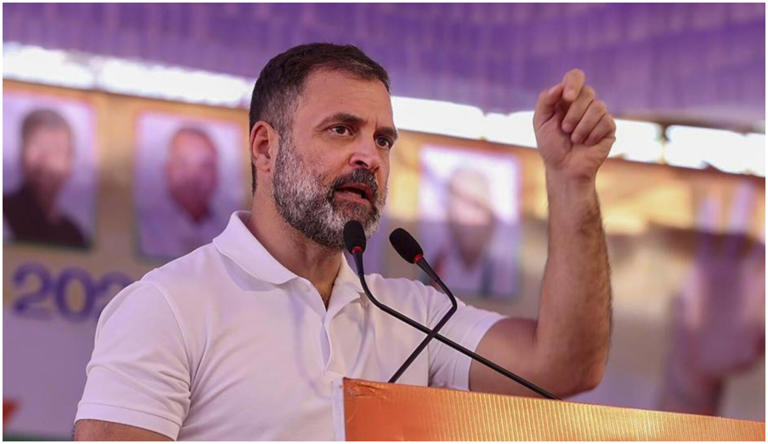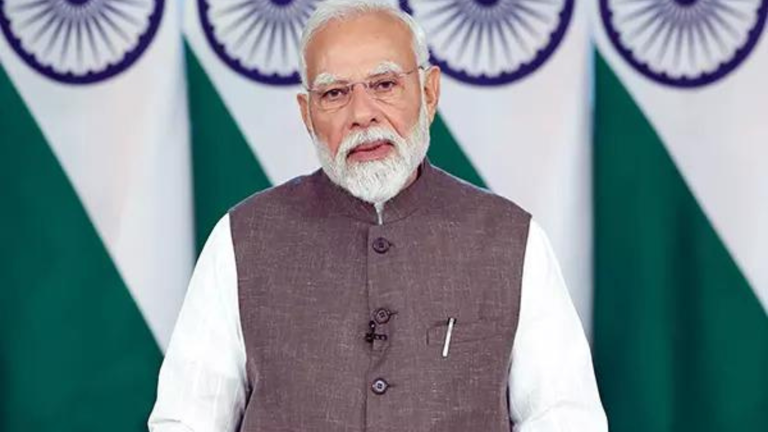“Narendra Surrender” Sparks Political Firestorm After Operation Sindoor
In the aftermath of Operation Sindoor, a tense 100-hour military standoff between India and Pakistan marked by airstrikes and missile exchanges, a new front has opened—this time in the political arena. At the center of it is Rahul Gandhi, the Leader of Opposition, who triggered a national controversy by sarcastically dubbing Prime Minister Narendra Modi as “Narendra Surrender” during a fiery speech in Bhopal, Madhya Pradesh.
Gandhi’s remark suggested that PM Modi allegedly succumbed to pressure from former US President Donald Trump, claiming that Modi agreed to a ceasefire following a phone call from Washington. The Congress leader drew historical contrasts, invoking Indira Gandhi’s defiance during the 1971 war, to accuse the BJP and RSS of habitually bowing to external powers. What followed was a blistering BJP counteroffensive, branding Gandhi’s statements as anti-national, pro-Pakistan, and dangerous to India’s military morale. The episode underscores how foreign policy, military decisions, and nationalism are now deeply embedded in India’s domestic political discourse.
Rahul Gandhi’s Charge—“History is Witness” to BJP’s Weakness
Speaking to a charged crowd in Bhopal, Rahul Gandhi accused the Modi government of compromising national sovereignty during a crucial military conflict. According to him, the ceasefire that ended Operation Sindoor—a high-tension battle that captured global headlines—wasn’t the result of Indian military strength but international intervention.
“A call came from Trump and Narendra ji immediately surrendered… this is the character of the BJP and RSS. They always bow down,” Gandhi declared.
Congress and Rahul Gandhi both disrespect PM Modi and the whole nation.pic.twitter.com/p1p8qyRUdN
— Prashant (@prashant10gaur) June 3, 2025
In his narrative, Gandhi painted Congress as the guardian of India’s strategic independence, pointing to Indira Gandhi’s refusal to yield to Cold War pressures in 1971. His framing seeks to reclaim the Congress legacy of strategic autonomy, while portraying the BJP as vulnerable to Western influence.
His comment was instantly viralized, amplified by Congress digital handles and allied influencers, triggering a nationwide political war over India’s foreign policy posture and defense decision-making.
BJP’s Retaliation—“Rahul Gandhi is Speaking Pakistan’s Language”
The Bharatiya Janata Party responded with fury. Spokespersons Tuhin Sinha and Pradeep Bhandari accused Rahul Gandhi of siding with India’s enemies and undermining the Indian Armed Forces. Their rebuttal wasn’t just political—it was loaded with patriotic and security-laced rhetoric:
“This is not just a lie; it is an insult to our jawans. Rahul Gandhi sounds like a spokesperson of Pakistan’s ISI,” Tuhin Sinha remarked.
"Narendra... Surrender": Congress MP Rahul Gandhi takes a jibe at Prime Minister Narendra Modi over ceasefire with Pakistan
— NDTV (@ndtv) June 3, 2025
"He is misleading people": BJP spokesperson Tuhin Sinha (@tuhins) to NDTV's @Ankit_Tyagi01 pic.twitter.com/WztqZ0iLUZ
The BJP emphasized that the ceasefire was a bilateral decision between Indian and Pakistani military commanders, asserting that US President Trump’s claims were self-aggrandizing and diplomatically inaccurate. India’s External Affairs Minister S. Jaishankar also confirmed that India did not accept third-party mediation, and the government stood firm under pressure.
Yet, despite the official line, Trump’s statement claiming he brokered the peace deal provided ammunition for Gandhi’s narrative, muddying the waters further.
The BJP painted Gandhi as a “serial offender” when it comes to national interest, citing past controversies like his comments on Pulwama, Balakot, and China. The party’s strategy is clear: frame Gandhi as a liability to national security, while consolidating its own image as the protector of Indian sovereignty.
Befitting Reply to Rahul Gandhi by Shivam Tyagi.pic.twitter.com/KW49EFIEeY
— Times Algebra (@TimesAlgebraIND) June 3, 2025
This episode reveals a deeper shift: India’s military actions are now political capital. Whether it’s Operation Sindoor or surgical strikes, both parties are racing to own the narrative of strength, sovereignty, and resistance to foreign influence.
नरेंदर... सरेंडर नहीं होना था pic.twitter.com/ADqPZHOVHv
— Congress (@INCIndia) June 3, 2025
Gandhi’s “Narendra Surrender” jibe may resonate with a section skeptical of Modi’s foreign policy optics. But the BJP’s aggressive countercharges and its patriotic framing may neutralize that impact, especially in a post-Uri, post-Balakot political culture where national security trumps nuance. As India prepares for a heated electoral season, this face-off over Operation Sindoor and the Trump call will likely remain a lightning rod issue—an emblem of how foreign policy optics and military decisions are no longer outside the political arena, but at its very core.





















